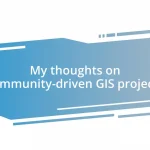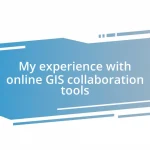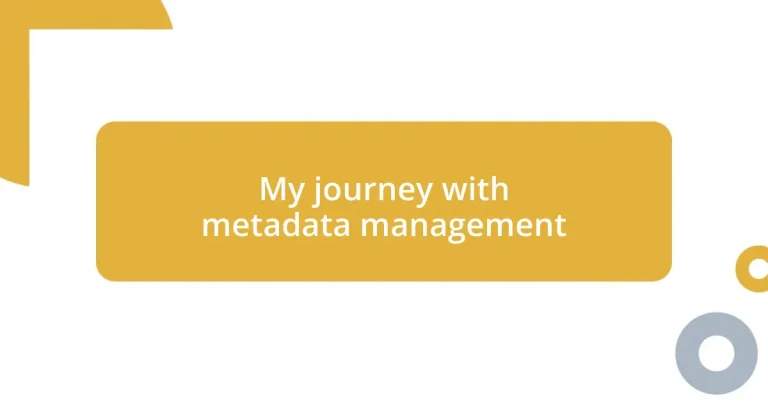Key takeaways:
- Metadata management is essential for understanding data context and enabling informed decision-making.
- Resistance to change in metadata projects can be overcome by fostering trust, engaging stakeholders, and providing training.
- Measuring success in metadata initiatives involves tracking user adoption, data retrieval time, report accuracy, and user satisfaction.
- Future trends include AI integration, enhanced data governance, and increased collaboration in metadata management practices.
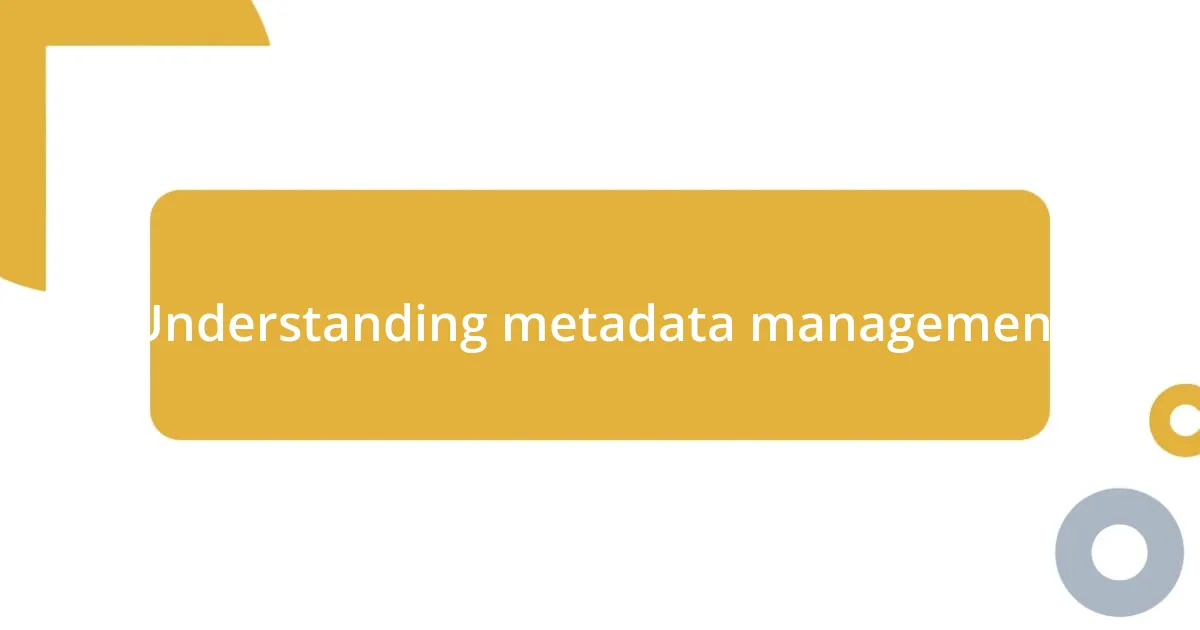
Understanding metadata management
Metadata management, at its core, is all about understanding the context and meaning of your data. I remember the first time I realized how critical this was—I was buried under a pile of disorganized files and could barely find what I needed. It struck me: how can we leverage data to make informed decisions if we don’t even know what we have?
When I dive into metadata management, I think of it as a roadmap for navigating complex data landscapes. It provides essential information about the data—like its source, format, and how it relates to other data. I once encountered a situation where proper metadata transformed a chaotic data repository into a streamlined asset, showcasing how powerful it can be to have clarity about our information.
Rhetorically asking myself, “What’s the use of data if we can’t make sense of it?” drives home the importance of this management practice. It’s not just about storage or organization; it’s about creating a narrative around your data that empowers smarter decision-making. Embracing metadata management has not only simplified my work but has fostered a deep appreciation for the data’s inherent value.
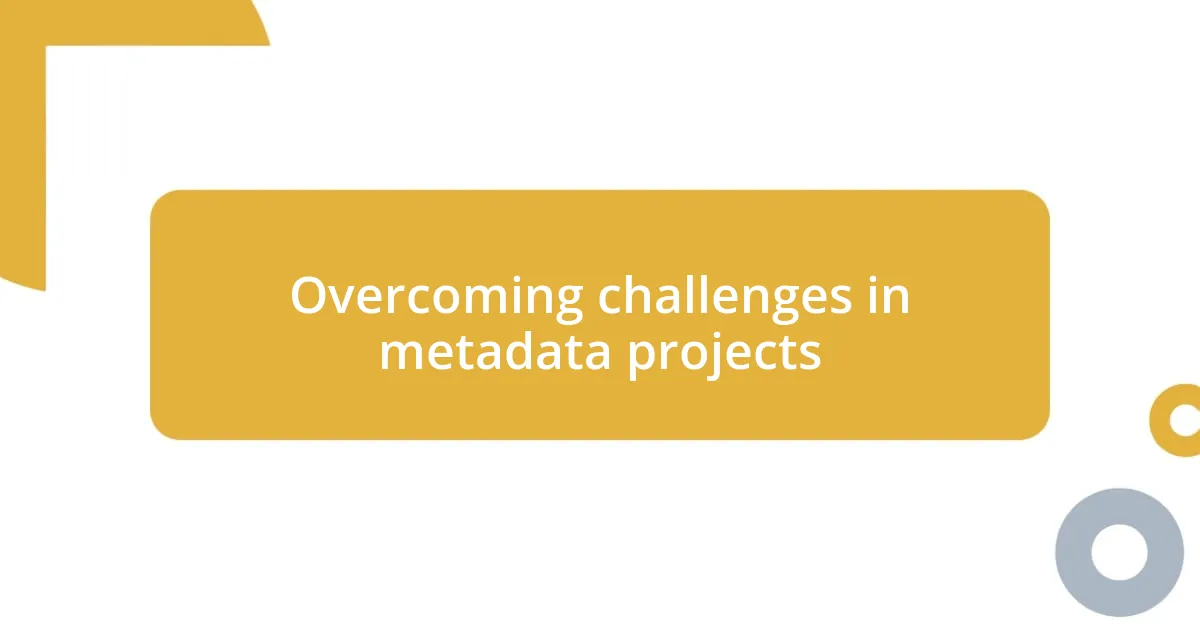
Overcoming challenges in metadata projects
One of the significant hurdles I faced in metadata projects was resistance to change. When I first introduced a new metadata management system, I encountered skepticism from my team. They were accustomed to their old processes and worried that adopting new tools would complicate their workflows. I realized that fostering a culture of trust and open communication was essential. Taking the time to demonstrate the benefits—like time savings and improved data quality—helped shift their perspective.
To navigate challenges in metadata projects effectively, consider these strategies:
- Engage stakeholders early: Involve them in discussions to gather input and build buy-in.
- Pilot programs: Test the new system in a small, manageable area. This creates quick wins and showcases the value.
- Regular training sessions: Address knowledge gaps and boost confidence in using new tools.
- Feedback loops: Actively seek feedback after implementation to ensure the system meets users’ needs.
Every hurdle can turn into a valuable learning opportunity if approached with patience and understanding. Embracing the journey rather than fixating solely on the outcomes can often lead to richer experiences and insights.
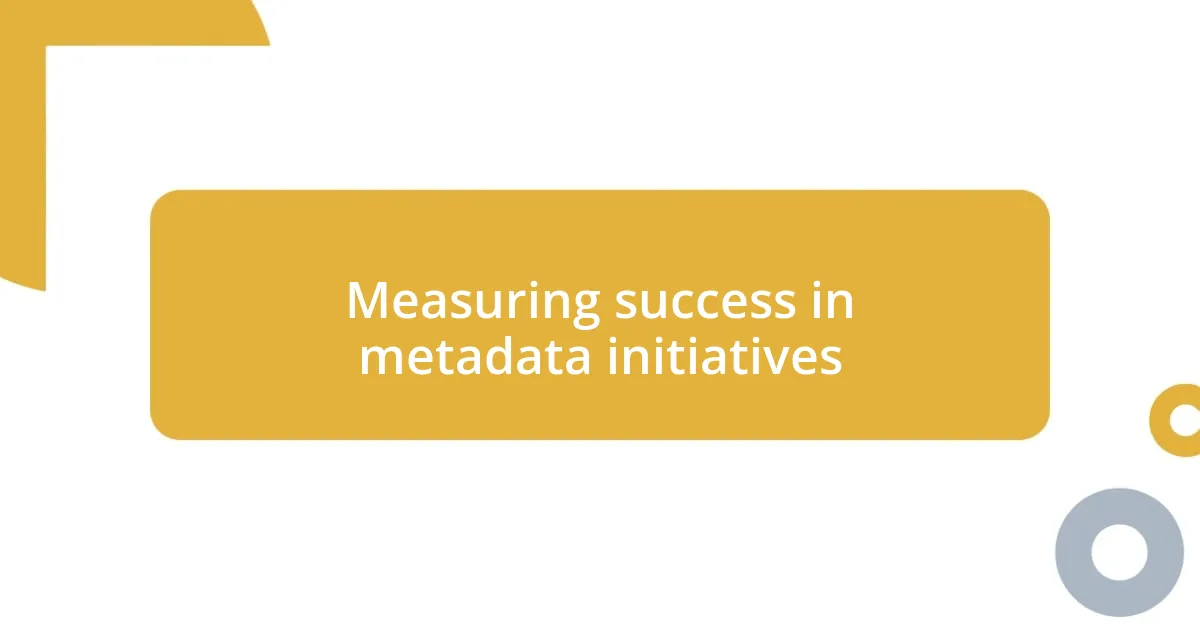
Measuring success in metadata initiatives
Measuring the success of metadata initiatives can sometimes feel like a daunting task. I recall a project where we implemented a new metadata strategy, and initially, it was tough to quantify our progress. However, after a few months, we started to see tangible outcomes that were impossible to ignore, such as reduced data retrieval time and enhanced reporting accuracy. It truly taught me that success can be measured not just in numbers but also in how those numbers affect day-to-day operations.
Tracking user adoption is pivotal in distinguishing successful metadata initiatives from the less effective ones. In one case, we set up regular check-ins after introducing new metadata tools, creating an open forum for users to share their experiences. The feedback we received was invaluable and helped us adjust our approach swiftly. It brought home the idea that success lies in understanding user engagement—after all, the ultimate goal is to make data management seamless, right?
A comprehensive approach to defining success can often involve a mix of qualitative and quantitative metrics. I’ve found that while time savings and improved data accuracy are essential, it’s also crucial to measure user satisfaction. In my experience, when users feel empowered by the tools they’re using, that’s when a metadata initiative truly shines.
| Success Metric | Description |
|---|---|
| User Adoption Rate | Percentage of users engaging with the new metadata tools. |
| Data Retrieval Time | Average time taken to find and access data before and after implementation. |
| Accuracy of Reports | Improvement in the correctness of data-derived reports after standardization. |
| User Satisfaction Score | Feedback from users on their experience with metadata tools post-implementation. |
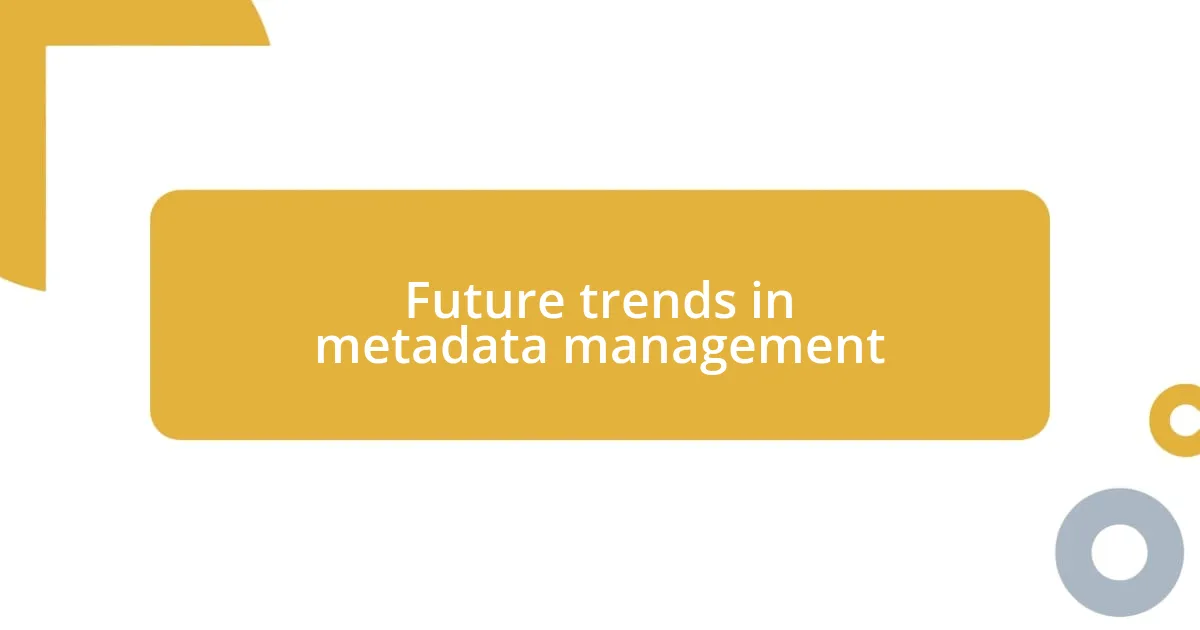
Future trends in metadata management
The landscape of metadata management is evolving rapidly, and I’m excited about where it’s heading. One trend I’ve noticed is the increasing integration of artificial intelligence (AI) in metadata management systems. Imagine AI tools that not only catalog data but also learn from user interactions, continuously improving their recommendations. This means more intuitive systems that could potentially reduce the manual effort involved in metadata tagging and management. I can see how this could transform my workflow—less time spent on tedious tasks could lead to more strategic insights.
Another noteworthy trend is the emphasis on data governance, particularly as regulatory compliance grows more complex. I remember grappling with the tangled web of data privacy rules myself, and it’s clear that having a solid metadata management strategy will become indispensable. With robust metadata frameworks, organizations can ensure that their data usage aligns with compliance standards. This makes me think: how can companies leverage metadata to enhance their governance practices, ensuring not just adherence to regulations but also fostering trust among users?
Lastly, I believe that collaboration tools will become central to metadata management. The notion of metadata as a shared asset rather than a standalone feature resonates with me deeply. When I worked on a cross-departmental project, the lack of shared metadata led to duplicated efforts and confusion. By leveraging collaborative platforms that allow teams to contribute to and access metadata collectively, I envision a more synchronized approach to data management. It’s engaging to ponder how such collective ownership could streamline processes and enhance the overall quality of data in organizations.







